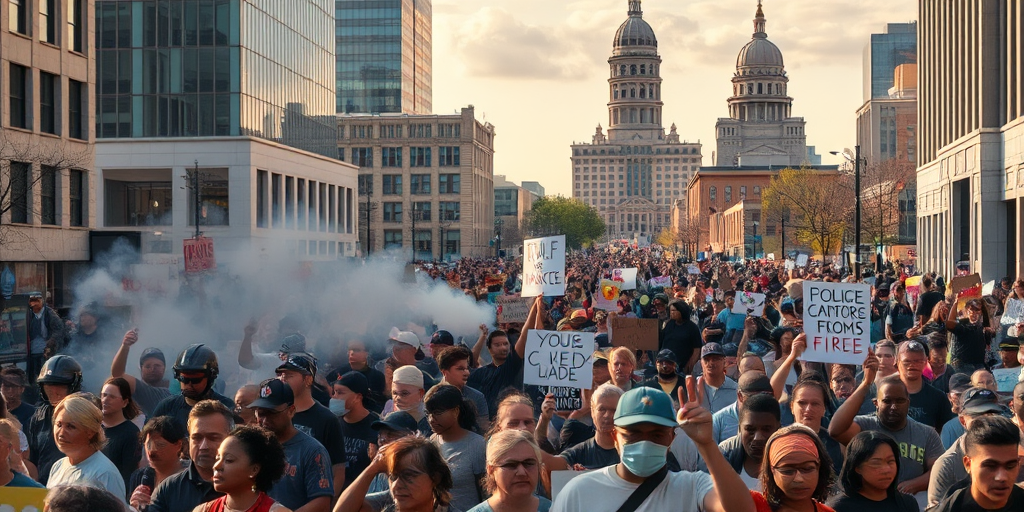Five Years After George Floyd’s Death: Are Police Reforms and DEI Initiatives at Risk?
In the wake of George Floyd’s death on May 25, 2020, which sparked a global outcry for racial justice and systemic change, the United States saw an unprecedented wave of reforms in policing and diversity practices. However, five years later, the once-vibrant momentum for change seems imperiled by the current political climate.
The Legacy of George Floyd’s Tragic Death
George Floyd’s murder, captured on video as former Minneapolis police officer Derek Chauvin knelt on his neck for nine distressing minutes, served as a catalyst for a worldwide movement. Floyd’s cries of “I can’t breathe” echoed across the globe, leading to protests in major cities from Milwaukee to Madison, where thousands expressed their outrage and called for justice.
Protests in cities like Milwaukee were marked by fervent activism; thousands rallied, closing down portions of Interstate 43, while in Madison, tensions led to confrontations with police using tear gas amid riots. Over 1,400 National Guard troops were deployed throughout Wisconsin, underscoring the protests’ intensity and the state’s commitment to maintaining order during these tumultuous times.
A Period of Reforms and New Leadership
In the political sphere, George Floyd’s tragic death became a central issue during the 2020 U.S. presidential campaign. Then-candidate Joe Biden expressed strong support for racial justice, a platform that resonated with many voters, leading to his victory in the election. Under Biden’s leadership, numerous policies aimed at enhancing civil rights and equity were implemented, reflecting the administration’s commitment to addressing systemic inequalities.
The Current Threat to Reforms
Fast forward to five years later, the political landscape has shifted dramatically. With former President Donald Trump back in power, the federal government has seen a rollback of many diversity, equity, and inclusion (DEI) initiatives and police reforms introduced during Biden’s presidency. Trump’s administration has dismantled federal repositories of police misconduct and reversed several executive orders related to policing reform, often favoring a return to merit-based systems over DEI principles.
This rollback has raised alarms about losing hard-won progress, a concern echoed by William Sulton, president of the American Civil Liberties Union Wisconsin. “Those battles won’t stay won,” Sulton remarked, emphasizing the need to continually address these issues to prevent a drastic rollback in civil rights advancements.
Local Government Efforts in Wisconsin
Despite federal pushback, local governments within Wisconsin have continued advocating for police reforms. Cities like Milwaukee, Racine, and Madison have enacted significant changes to reduce negative police encounters. Measures such as banning chokeholds, eliminating no-knock warrants, and mandating body cameras have been implemented in response to the deaths of individuals like Breonna Taylor and Jacob Blake.
Fred Royal, former president of Milwaukee’s NAACP, noted the city’s progressive policies, stating, “The Fire and Police Commission’s changes represent some of the most forward-thinking use-of-force policies in America.”
Milwaukee has also faced its own challenges. Financial pressures led to a redistribution of policy responsibilities within the Fire and Police Commission, affecting DEI efforts. Milwaukee Mayor Cavalier Johnson pointed to the city’s fiscal constraints, which provided an opportunity for GOP lawmakers to impose restrictions on DEI policies and municipal policing practices.
Continuing the Fight for Equality
Advocates such as Tanya McLean, executive director of Leaders of Kenosha, and activist Nate Hamilton continue to push for reforms and maintain dialogue with law enforcement to address systemic issues. Despite facing conservative opposition, these leaders remain committed to promoting racial justice and equality in their communities.
Hamilton has played an instrumental role in shaping Milwaukee’s police reform policies, advocating for the community to work with law enforcement on crafting solutions that resonate with local needs. “We need to stay steady and not overwhelm the system,” he advised.
The Generational Impact of Racial Discrimination
The societal treatment of African Americans continues to be a pervasive concern. Dr. Christopher Ford, an emergency medicine doctor, highlights this issue by teaching his children how to navigate interactions with police safely—a lesson passed down through generations in his family.
Ford’s experience underscores the ongoing challenges faced by African American communities, even as reforms are nominally in place. He explained, “The society that they grow up in sees them differently than mom and dad does.”
Looking Forward: What’s Next for Wisconsin?
As Wisconsin residents reflect on the last five years, the journey toward meaningful reform appears both promising and uncertain. While local governments have embraced changes to policing policies, the broader political climate threatens to undermine these efforts.
The community’s role in maintaining momentum for reform remains vital. Advocacy groups and individual residents continue to challenge racial inequalities, striving to sustain and build upon the progress achieved since George Floyd’s death.
In conclusion, while significant strides have been taken in Wisconsin and beyond, the risk of reversing these changes is an ever-present threat. The community’s vigilance and ongoing dialogue with policymakers and law enforcement are critical to preserving these advancements and ensuring that the legacy of George Floyd catalyzes long-term, meaningful change.







